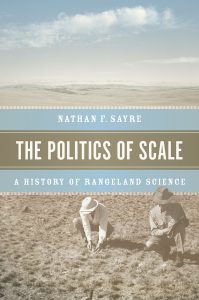#ReadUPScience: Green thinking in the era of Trump

In a recent double review for the New Scientist, “Green thinking in the era of Trump,” Fred Pearce took on two of our recent books in environmental studies—Eric T. Freyfogle’s A Good that Transcends: How US Culture Undermines Environmental Reform and Nathan F. Sayre’s The Politics of Scale: A History of Rangeland Science. Read clips from Pearce’s commentary on each, after the jump.
***

“What’s going on? In his book A Good That Transcends, lawyer Eric Freyfogle doesn’t mention Trump. But he is clear that what lies behind long-standing and growing ‘popular resistance’ to green thinking is a devotion to the primacy of the individual and private property at the expense of any ideas that require collective endeavor, such as environmental management of the great spaces and wildernesses where bison once roamed. . . .
If not controlled by strong environmental law, private property destroys natural assets by converting them into cash. Look at how fences and ploughs have wrecked the ecosystems of the US Midwest. Privatization didn’t prevent the dust bowl of the 1930s. Even access to rainfall—a quintessentially collective asset—is handed out as a private right that goes with land. Result: California is parched as farmers defend to the death their legal right to keep abstracting.
This is a tragedy not of the commons but of private property. And perhaps of the US Constitution, too. ‘Life, liberty and the pursuit of happiness’ won’t save nature. To do that, says Freyfogle, we have to ‘curtail individual liberties.’ Landowners cannot have absolute rights to their land. We need to banish the idea that individuals or markets can fix nature.”
***

“In The Politics of Scale, geographer Nathan Sayre makes a not dissimilar case. The US rangelands – the grasslands, steppe, prairies and deserts of the American West—have been badly managed because of bad science, he says. Science encouraged people to demonize cattle grazers as ecological despoilers and to obsess about preventing fires—even though the grasslands were created by grazing and fire is an essential part of many ecosystems.
Much of this he puts down to the ‘fateful mistake’ of academic devotion to the early 20th-century ideas of Nebraskan botanist Frederic Clements on ecological succession. Clements held that every place had only one correct ‘climax’ ecosystem, and any variance on that had to be resisted. Fires destroyed climax ecosystems, and grasslands had to be maintained in their present state through rooting out weeds and imposing fixed stocking rates for grazing animals.
Such environmental management is bound to fail. It has, all over the American West. So how did such ideas gain widespread and long-lasting acceptance? . . . Here Sayre agrees with Freyfogle about the unwritten political agenda of the scientists—how ‘outside capital was portrayed not as the cause of rangeland degradation but as the solution to it.’ The common pastures had to be privatized.”
***
To read the New Scientist review in full, click here.
To read more about A Good that Transcends, click here.
To read more about The Politics of Scale, click here.